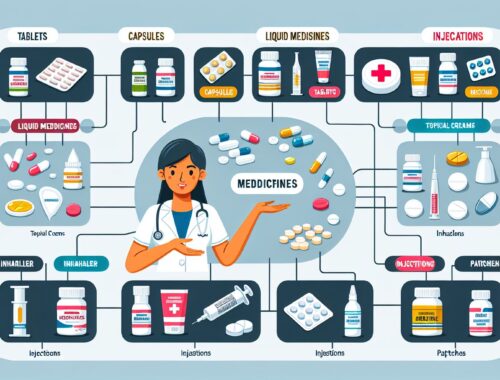
Understanding the Different Types of Medicines
Medicines play a crucial role in our lives, helping us to recover from illnesses, manage chronic conditions, and alleviate uncomfortable symptoms. With a multitude of medications available, it’s essential to understand the different types and how they work to ensure safe and effective treatment. Let’s dive into the world of medicine and explore the various categories and their uses.
Introduction
Medicines can be categorized into several types, each designed to target specific conditions and symptoms. Understanding these types can empower individuals to make informed decisions about their healthcare and achieve the best possible outcomes.
Body
1. Prescription Medicines
Prescription medicines are medications that require a written order from a healthcare professional, commonly a doctor or a specialist. These drugs are typically used for severe or chronic illnesses, such as heart disease, diabetes, or mental health conditions. Prescription medicines undergo extensive testing and clinical trials to ensure their safety and efficacy. It is crucial to follow the prescribed dosage and instructions carefully to avoid any potential complications.
2. Over-the-counter (OTC) Medicines
Over-the-counter medicines are readily available without a doctor’s prescription. They are generally used to treat common ailments, including headaches, coughs, colds, allergies, and minor pain. Some OTC medicines may have specific age restrictions or dosage recommendations, so it’s essential to read labels and seek advice from a pharmacist if needed. OTC medicines provide convenience and fast relief for mild conditions but should not be used excessively or mixed with prescription medications without consulting a healthcare professional.
3. Herbal and Natural Remedies
Herbal and natural remedies are derived from plants, minerals, or animal products. These medicines have been used for centuries in many cultures and are often viewed as alternative or complementary treatments. While some herbal remedies may have proven benefits, it’s important to remember that they are not regulated in the same way as prescription or OTC medications. Caution should be exercised when using herbal remedies, as they may interact with other medications or cause adverse effects. Consulting with a knowledgeable healthcare provider is crucial before starting any herbal or natural remedy.
4. Vaccines
Vaccines play a pivotal role in preventing many infectious diseases. They work by stimulating the immune system to recognize and destroy specific pathogens, thereby protecting us from future infections. Vaccines have been instrumental in eradicating diseases like smallpox and significantly reducing the spread of illnesses such as polio, measles, and influenza. It’s important to stay up-to-date with recommended vaccines to safeguard both individual and public health.
5. Specialty Medicines
Specialty medicines are a distinct category of medications used for complex, chronic, or rare conditions. These drugs often require specialized handling, administration, and monitoring. Specialty medicines may be used to manage chronic autoimmune disorders, cancer, genetic conditions, or organ transplants. Due to their specialized nature, these medications may be more expensive and require coordination between different healthcare professionals for optimal care.
Conclusion
Medicines come in various forms, each serving a specific purpose in preventing, managing, and treating different medical conditions. Whether they are prescription medications, over-the-counter remedies, herbal alternatives, vaccines, or specialty drugs, their proper use and understanding is crucial for safe and effective treatment. As responsible healthcare consumers, being informed about different types of medicines empowers us to make well-informed decisions about our health, leading to better outcomes and improved well-being.
You May Also Like

Understanding the Different Types of Medicines
February 19, 2024
Exploring the Different Types of Medicines
March 28, 2024

